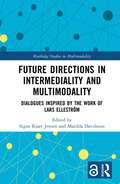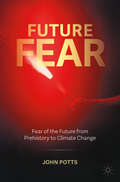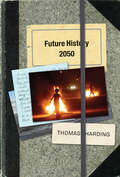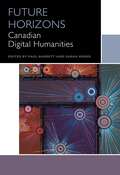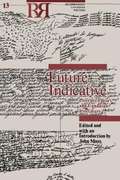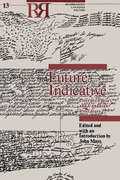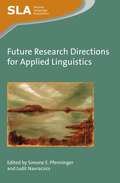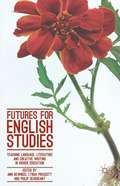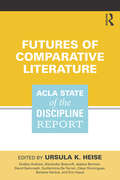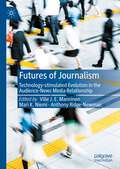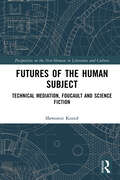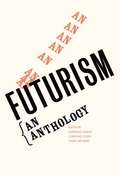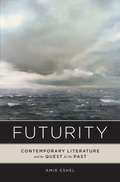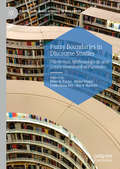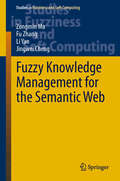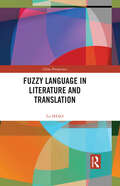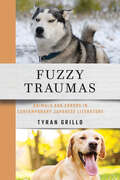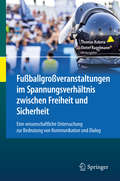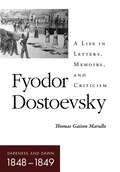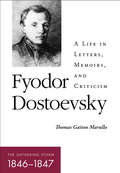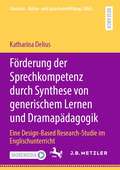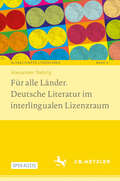- Table View
- List View
Future Directions in Intermediality and Multimodality: Dialogues Inspired by the Work of Lars Elleström (Routledge Studies in Multimodality)
by Matilda Davidsson Signe Kjaer JensenThis collection brings together leading scholars across disciplines to reflect on the relationship between intermediality and multimodality and future directions for the contemporary mediascape, building on a 2022 Linnaeus University lecture series honouring the legacy of Lars Elleström, following his untimely death in December 2021.The volume contributes to ongoing dialogues about media and society, the challenges and opportunities for academia to engage with developments in the evolving mediascape, and interdisciplinary pathways towards engaging with these questions. Each chapter features an established figure in such fields as multimodality, intermediality, semiotics, narratology, art history, and adaptation studies. Each essay is prefaced with an introduction by the editors and bookended with a discussion transcribed from the original live presentations. A concluding chapter looks ahead to future directions, opening new lines of inquiry around the possibilities for intermediality and multimodality research towards continuing to build on Elleström’s seminal work in the field.This book will be of interest to scholars in multimodality, intermediality, and media and communication studies.The Open Access version of this book, available at http://www.taylorfrancis.com, has been made available under an Attribution-Non-Commercial-No Derivative Licence (CC-BY-NC-ND) 4.0 license.
Future Fear: Fear of the Future from Prehistory to Climate Change
by John PottsThis book places the contemporary fear of climate change in historical perspective, showing that throughout human history the dominant perspective on the future has been one of fear. Across a broad historical sweep, the book describes the varied means employed to predict and control the future: magic, religion, science, and technology. Future Fear traces fear of the future from prehistory to the present, culminating in the contemporary fear of imminent climate change catastrophe. Consideration is also given to hope in a more positive future, revealing that visions of the future have often been a mingling of fear and hope.
Future History 2050
by Thomas HardingThis future history of the next thirty years, imagined by bestselling author Thomas Harding, is a compelling and startling call to action. In 2020, a researcher is shocked to find a set of notebooks detailing the history of the next thirty years. Is this a hoax? Or could it be real? The notebooks, written in the year 2050, contain interview transcripts between teenage Billy and Gran Nancy. We learn about the great climate SHOCK, when global temperatures rise much faster than anticipated, resulting in catastrophic consequences for humanity. We learn about a shift away from democracy, toward unelected “ethnarchs” — heads of corporations who use their access to our personal data to competently run the world. We learn about the giant city towers where most people live, work and play inside — where it's safe from natural disasters and viral outbreaks. And between these interviews, we learn more about Billy, whose interest in the history that has been erased from the official record is causing trouble in 2050. Is it too late to change the past to save the future? Key Text Feature glossary
Future Horizons: Canadian Digital Humanities (Canadian Literature Collection)
by Susan Brown Gregory Betts Dean Irvine Sandra Djwa Constance Crompton Katherine McLeod Klara Du Plessis Kiera Obbard Roopika Risam Andrea Zeffiro Deanna Fong M Ryan Fitzpatrick M Eric Schmaltz Dani Spinosa M David Gaertner M Mark V. Campbell M Jon Saklofske Julia Polyck-O’Neill Kim Martin Rashmeet Kaur Pascale Dangoisse Michelle Schwartz Graham H. Jensen M Allan Cho Sarah Zhang Kendra Cowley Asen IvanovAu fil des vingt et quelques chapitres que compte cet ouvrage, les auteurs explorent le passé, le présent et l’avenir de la recherche, de l’enseignement et de l’expérimentation en sciences humaines numériques au Canada. Ce recueil, qui rassemble les travaux de chercheuses et de chercheurs établis et émergents, présente des initiatives contemporaines dans le domaine des sciences humaines numériques. Celles-ci sont conjuguées à un réexamen de l’héritage légué par ce domaine jusqu’à ce jour et à des discussions sur son potentiel. Future Horizons jette aussi un regard historique sur des projets numériques d’envergure, quoique largement méconnus, qui ont été réalisés au Canada. Future Horizons fait plonger le lecteur dans des projets qui mettent à contribution une vaste gamme d’approches — des jeux numériques aux laboratoires ouverts, des archives sonores à la poésie numérique, des arts visuels à l’analyse textuelle numérique — et qui puisent dans des matériaux canadiens tant historiques que contemporains. Dans leurs essais, les auteurs font voir comment une telle diversité d’approches remet en cause la connaissance en permettant aux chercheurs de poser de nouvelles questions.Ce recueil remet en question l’idée selon laquelle il n’existerait qu’une seule définition des sciences humaines numériques ou une seule identité collective nationale. En observant les interactions du numérique avec la race, l’autochtonie, le genre et la sexualité — sans oublier l’histoire, la poésie et le concept de nation —, Future Horizons propose une vue élargie du travail à l’intersection des sciences humaines numériques et des sciences humaines traditionnelles dans le Canada d’aujourd’hui. Ce livre est publié en anglais.Formats disponibles : couverture souple, PDF accessible et ePub accessible.
Future Indicative: Literary Theory and Canadian Literature
by John MossFuture Indicative: Literary Theory and Canadian Literature. University of Ottawa Symposium. April 25 to 27, 1986. The title worked well--as a rubric under which to gather; as a non-proscriptive label of activities; as a summary of the symposium's achievement. As a book title it works well, too. The implications it carries of change, commitment, and the prophetic are, perhaps, even more appropriate to a book.
Future Indicative: Literary Theory and Canadian Literature (Reappraisals: Canadian Writers)
by John MossThe format of this book is arbitrary and exact, the way paint is in a landscape by Alex Colville. It follows the program of the symposium that took place at the University of Ottawa, from April 25 to 27, 1986. As Bakhtin leaps from the sidelines to centre stage, as Derrida clambers out of orchestra pit into the prompter's box, and Lancan swings from the flies, as Foucault, Lévi-Strauss, Saussure, Barthes, and a throng of others rhubarb their way through the text, one recognizes just how connected all the disparate elements of this critical extravaganza really are.
Future Research Directions for Applied Linguistics
by Judit Navracsics Simone E. PfenningerThis edited volume provides an overview of current thinking and directions for further research in applied linguistics by bringing together in a single volume a range of perspectives regarding original research agendas and innovative methodological approaches. It focuses not only on the challenges that applied linguistics researchers have been facing in recent years but also on producing workable and productive research designs and on identifying ways of how alternatives to conventional research methodologies can be used. Discussions featured in the volume include the so-called ‘Bilingual Advantage’ in psycho- and neurolinguistics; the optimal starting age debate in foreign language learning; the growing interest among applied linguists in more nuanced and more complex (statistical) data analysis and the priority given to more descriptive and social approaches to linguistics rather than to theorising. The collection will be a useful reference and stimulus for students, researchers and professionals working in the areas of applied linguistics, psycholinguistics, second language acquisition and second language education.
Futures for English Studies: Teaching Language, Literature And Creative Writing In Higher Education
by Philip Seargeant Lynda Prescott Ann HewingsFutures for English Studies brings together chapters by leading writers across the curriculum area of English to investigate how the component parts of English (literature, language, and creative writing) are located institutionally in higher education and to explore the interdisciplinary prospects of a subject which spans the humanities and social sciences. Through explorations of changing foci in a variety of contexts, the book examines the value and purpose of teaching and researching English language, literature and creative writing in the twenty-first century, both within Anglophone countries and the wider world. The contributors, all practicing educators and researchers in the field, bring a wide range of perspectives to the theme of the development of the discipline, and illustrate that the strengths of English Studies as an academic subject lie not only in its traditional breadth and depth, but also in a readiness to adapt, experiment, and engage with other subjects.
Futures of Comparative Literature: ACLA State of the Discipline Report
by Ursula K HeiseFutures of Comparative Literature is a cutting edge report on the state of the discipline in Comparative Literature. Offering a broad spectrum of viewpoints from all career stages, a variety of different institutions, and many language backgrounds, this collection is fully global and diverse. The book includes previously unpublished interviews with key figures in the discipline as well as a range of different essays – short pieces on key topics and longer, in-depth pieces. It is divided into seven sections: Futures of Comparative Literature; Theories, Histories, Methods; Worlds; Areas and Regions; Languages, Vernaculars, Translations; Media; Beyond the Human; and contains over 50 essays on topics such as: Queer Reading; Human Rights; Fundamentalism; Untranslatability; Big Data; Environmental Humanities. It also includes current facts and figures from the American Comparative Literature Association as well as a very useful general introduction, situating and introducing the material. Curated by an expert editorial team, this book captures what is at stake in the study of Comparative Literature today.
Futures of Digital Scholarly Editing
by Kenneth M. PriceExploring technology, ethics, and culture to unlock digital scholarship&’s futureFutures of Digital Scholarly Editing navigates the ever-shifting terrain of digital academia, examining practical and ethical considerations as technology continues to evolve. In this indispensable collection, digital humanities practitioners and scholars work with a wide range of archival materials to confront key challenges surrounding the adaptation and sustainability of digital editorial projects as well as their societal impact. Broaching essential questions at the nexus of technology and culture, Futures of Digital Scholarly Editing is organized around three principal frameworks: access, sustainability, and interoperability; ethics and community involvement; and the evolution of textual scholarship. From addressing outdated technical infrastructures to fostering new collaborations, this volume serves as a beacon guiding scholars and institutions through the complexities of digital editing in an era of profound technological and societal transformation. Contributors: Stephanie P. Browner, The New School; Julia Flanders, Northeastern U; Ed Folsom, U of Iowa; Nicole Gray, U of Nebraska–Lincoln; Cassidy Holahan, U of Nevada, Las Vegas; Fotis Jannidis, U of Würzburg; Aylin Malcolm, U of Guelph; Sarah Lynn Patterson, U of Massachusetts Amherst; Elena Pierazzo, U of Tours; K.J. Rawson, Northeastern U; Whitney Trettien, U of Pennsylvania; John Unsworth, U of Virginia; Dirk Van Hulle, U of Oxford; Robert Warrior, U of Kansas; Marta L. Werner, Loyola U Chicago. Retail e-book files for this title are screen-reader friendly with images accompanied by short alt text and/or extended descriptions.
Futures of Journalism: Technology-stimulated Evolution in the Audience-News Media Relationship
by Anthony Ridge-Newman Ville J. E. Manninen Mari K. NiemiThis book examines how technologies are changing, will change, or could change the relationship between audiences and news media. It highlights how novel technologies could have fundamental implications for the way that news media interact with wider society. The book comprises of four thematic parts. Firstly, it focuses on the impact of technological development on the news media business, exploring how news media uses new technologies to improve their sustainability. Secondly, it considers the ethical dilemmas that arise when audience-news media relationships are transformed by technological development. The third part of the book approaches the effects of novel technologies from the journalists’ viewpoint: how do new technologies intervene in the audience-news media relationship through journalistic work? Finally, the fourth part dissects the ways new technologies can impact audience-news media relationships through transforming audience agency, audience preferences and news media’s understanding of them.
Futures of the Human Subject: Technical Mediation, Foucault and Science Fiction (Perspectives on the Non-Human in Literature and Culture)
by Sławomir KoziołFutures of the Human Subject focuses on the representation of the effects of technology use on human subjectivity in several recent near-future science fiction novels. Sharing the idea that human subjects are constructed in the world in which they exist, this volume inscribes itself in the wider field of posthumanism which contests the liberal humanist notion of people as self-contained, autonomous agents. At the same time, it is the first substantial study of literary representations of the human subject carried out within the conceptual framework of Foucault-inflected philosophy of technical mediation, which examines the nature of the relation between people and specific technologies as well as the way in which this relation affects human subjectivity. As such, the book may help readers to exercise more effective control over the way in which they are constituted as subjects in this technologically saturated world.
Futurism: An Anthology
by Lawrence Rainey Christine Poggi Laura WittmanIn 1909, F. T. Marinetti published his incendiary Futurist Manifesto, proclaiming, "We stand on the last promontory of the centuries!!" and "There, on the earth, the earliest dawn!" Intent on delivering Italy from "its fetid cancer of professors, archaeologists, tour guides, and antiquarians," the Futurists imagined that art, architecture, literature, and music would function like a machine, transforming the world rather than merely reflecting it. But within a decade, Futurism's utopian ambitions were being wedded to Fascist politics, an alliance that would tragically mar its reputation in the century to follow. Published to coincide with the 100th anniversary of the founding of Futurism, this is the most complete anthology of Futurist manifestos, poems, plays, and images ever to be published in English, spanning from 1909 to 1944. Now, amidst another era of unprecedented technological change and cultural crisis, is a pivotal moment to reevaluate Futurism and its haunting legacy for Western civilization.
Futurist Women: Florence, Feminism And The New Sciences (Palgrave Studies in Modern European Literature)
by Paola SicaFuturist Women broadens current debates on Futurism and literary studies by demonstrating the expanding global impact of women Futurist artists and writers in the period succeeding the First World War. This study initially focuses on the local: the making of the self in the work by the women who were affiliated with the journal L'Italia futurista during World War I in Florence. But then it broadens its field of inquiry to the global. It compares the achievements of these women with those of key precursors and followers. It also conceives these women's work as an ongoing dialogue with contemporary political and scientific trends in Europe and North America, especially first wave feminism, eugenics, naturism and esotericism. Finally, it examines the vital importance and repercussions of these women's ideas in current debates on gender and the posthuman condition. This ground-breaking study will prove invaluable for all scholars and upper-level students of modern European literature, Futurism, and gender studies.
Futurity: Contemporary Literature and the Quest for the Past
by Amir EshelWhen looking at how trauma is represented in literature and the arts, we tend to focus on the weight of the past. In this book, Amir Eshel suggests that this retrospective gaze has trapped us in a search for reason in the madness of the twentieth century’s catastrophes at the expense of literature’s prospective vision. Considering several key literary works, Eshel argues in Futurity that by grappling with watershed events of modernity, these works display a future-centric engagement with the past that opens up the present to new political, cultural, and ethical possibilities—what he calls futurity. Bringing together postwar German, Israeli, and Anglo-American literature, Eshel traces a shared trajectory of futurity in world literature. He begins by examining German works of fiction and the debates they spurred over the future character of Germany’s public sphere. Turning to literary works by Jewish-Israeli writers as they revisit Israel’s political birth, he shows how these stories inspired a powerful reconsideration of Israel’s identity. Eshel then discusses post-1989 literature—from Ian McEwan’s Black Dogs to J. M. Coetzee’s Diary of a Bad Year—revealing how these books turn to events like World War II and the Iraq War not simply to make sense of the past but to contemplate the political and intellectual horizon that emerged after 1989. Bringing to light how reflections on the past create tools for the future, Futurity reminds us of the numerous possibilities literature holds for grappling with the challenges of both today and tomorrow.
Fuzzy Boundaries in Discourse Studies: Theoretical, Methodological, and Lexico-Grammatical Fuzziness (Postdisciplinary Studies in Discourse)
by Péter B. Furkó Ildikó Vaskó Csilla Ilona Dér Dorte MadsenThis book focuses on the multifarious aspects of ‘fuzzy boundaries’ in the field of discourse studies, a field that is marked by complex boundary work and a great degree of fuzziness regarding theoretical frameworks, methodologies, and the use of linguistic categories. Discourse studies is characterised by a variety of theoretical frameworks and disciplinary fields, research methodologies, and lexico-grammatical categories. The contributions in this book explore some of the nuances and implications of the fuzzy boundaries in these areas, resulting in a wide-reaching volume which will be of interest to students and scholars of discourse studies in fields including sociology, linguistics, international relations, philosophy, literary criticism and anthropology.
Fuzzy Knowledge Management for the Semantic Web
by Li Yan Zongmin Ma Fu Zhang Jingwei ChengThis book goes to great depth concerning the fast growing topic of technologies and approaches of fuzzy logic in the Semantic Web. The topics of this book include fuzzy description logics and fuzzy ontologies, queries of fuzzy description logics and fuzzy ontology knowledge bases, extraction of fuzzy description logics and ontologies from fuzzy data models, storage of fuzzy ontology knowledge bases in fuzzy databases, fuzzy Semantic Web ontology mapping, and fuzzy rules and their interchange in the Semantic Web. The book aims to provide a single record of current research in the fuzzy knowledge representation and reasoning for the Semantic Web. The objective of the book is to provide the state of the art information to researchers, practitioners and graduate students of the Web intelligence and at the same time serve the knowledge and data engineering professional faced with non-traditional applications that make the application of conventional approaches difficult or impossible.
Fuzzy Language in Literature and Translation (China Perspectives)
by Lu SHAOBringing a fuzzy logic-based approach into translation studies and drawing on the theory of information entropy, this book discusses the translation of fuzzy language in literary works and advances a new method of measuring text fuzziness between translation and source text. Based on illustrative examples from the popular novel The Da Vinci Code and its two translated Chinese versions, the study demonstrates the fuzziness measuring method through an algorithmic process. More specifically, information entropy is applied to measure the uncertainty associated with readers’ understanding of the original and its corresponding target texts. The underlying hypothesis is that the probability distribution in which readers will understand identified fuzzy discourse is measurable. By further explicating the validity of the hypothesis, it seeks to solve translational “fuzzy” problems in the translation process and offers an alternative, novel approach to the study of “fuzzy” literary texts and their translation. Hopefully, the argument of the book that the intrinsic uncertainty of fuzzy language can be evaluated through Shannon’s information entropy will open up a new avenue to the quantitative description of the fuzziness of language and translation. This book will be of interest to scholars and students in translation studies, applied linguistics, and literary criticism.
Fuzzy Traumas: Animals and Errors in Contemporary Japanese Literature
by Tyran GrilloIn Fuzzy Traumas, Tyran Grillo critically examines the portrayal of companion animals in Japanese literature in the wake of the 1990s "pet boom." Blurring the binary between human and nonhuman, Grillo draws on Japanese science fiction, horror, guide-dog stories, and a notorious essay on euthanasia, treating each work as a case study of human-animal relationships gone somehow awry. He makes an unprecedented case for Japan's pet boom and how the country's sudden interest in companion animals points to watershed examples of "productive errors" that provide necessary catalysts for change.Examining symbiotic concepts of "humanity" and "animality," Grillo challenges negative views of anthropomorphism as something unethical, redefining it as a necessary rupture in, not a bandage on, the thick skin of the human ego. Fuzzy Traumas concludes by introducing the paradigm shift of "postanimalism" as a detour from the current traffic jam of animal-centered philosophies, arguing that humanity cannot move past anthropocentricism until we reflect honestly on what it means for the human condition.
Fußballgroßveranstaltungen im Spannungsverhältnis zwischen Freiheit und Sicherheit: Eine wissenschaftliche Untersuchung zur Bedeutung von Kommunikation und Dialog
by Dieter Kugelmann Thomas KuberaDas Buch präsentiert die wissenschaftlichen Ergebnisse des interdisziplinären Forschungsprojektes „Mehr Sicherheit im Fußball – Verbessern der Kommunikationsstrukturen und Optimieren des Fandialogs“. Die aus dem vom Bundesministerium für Bildung und Forschung geförderten Projekt hervorgehenden Erkenntnisse zum Status Quo der Sicherheitsgewährleistung bei Fußballgroßveranstaltungen bieten eine Reihe von Ansätzen zur Verbesserung von Kommunikationsstrukturen und -prozessen. Sie basieren auf Untersuchungen an 25 Vereinsstandorten der ersten drei Profiligen. Das Feld wurde durch Interviews mit Experten aus Fanarbeit, Fanszenen, Polizeibehörden, Vereinen und Kommunen und durch Befragungen von Stadionbesuchern, Fangruppierungen, Reisenden im Fanreiseverkehr und der Bevölkerung erschlossen. Weiterhin wurden rechtliche Stellungnahmen und Empfehlungen erarbeitet sowie eine technische Kommunikationsplattform beforscht, die eine effektive Zusammenarbeit der verschiedenen Akteure ermöglichen soll.
Fyodor Dostoevsky–Darkness and Dawn: A Life in Letters, Memoirs, and Criticism (NIU Series in Slavic, East European, and Eurasian Studies)
by Thomas Gaiton MarulloFyodor Dostoevsky—Darkness and Dawn (1848–1849), the third and final volume on the writer's childhood, adolescence, and youth, seeks to disclose, in a detailed and intimate way, Dostoevsky's last two years before his exile to Siberia. Together with the first two volumes, it attempts to present for the first time a complete and congruent picture of the writer's first twenty-eight years. Thomas Gaiton Marullo first examines diverse responses of the Russian church, state, and citizens to the French socialists, in particular, Charles Fourier, and to the revolutions of 1848 before he moves to lively debates on Dostoevsky's socialism and new attacks on his writings. He then considers the dynamics of the Petrashevsky and Durov circles; fresh assaults on Dostoevsky's works; and the increasing desperation of the writer himself, particularly with Andrei Kraevsky. In the final sections of the book, Marullo sheds light on Dostoevsky's readings of Belinsky's letter to Gogol, the arrests of Petrashevsky and company, including Dostoevsky and his brothers, Andrei and Mikhail, as well as his responses to members of the Investigative Commission for the Petrashevsky Affair, his eight months in prison in the Peter-Paul Fortress, his mock execution on the Semyonovsky Parade Ground, and his departure to exile in Siberia.This volume will be of interest to scholars, students, and devotees not only of Dostoevsky, but also of Russian and European history, culture, and civilization.
Fyodor Dostoevsky—The Gathering Storm: A Life in Letters, Memoirs, and Criticism (NIU Series in Slavic, East European, and Eurasian Studies)
by Thomas Gaiton MarulloThis second book in a three-volume work on the young Fyodor Dostoevsky is a diary-portrait of his early years drawn from letters, memoirs, and criticism of the writer, as well as from the testimony and witness of family and friends, readers and reviewers, and observers and participants in his life. The result of an exhaustive search of published materials on Dostoevsky, this volume sheds crucial light on the many unexplored corners of Dostoevsky's life in the time between the success of his first novel, Poor Folk, and the failure of his next four works. <P><P>Thomas Gaiton Marullo lets the original writers speak for themselves—the good and the bad, the truth and the lies—and adds extensive notes with correctives, counterarguments, and other pertinent information.Marullo looks closely at Dostoevsky's increasingly tense ties with Vissarion Belinsky, Nikolai Nekrasov, Ivan Turgenev, and other figures of the Russian literary world. He then turns to the individuals who afforded Dostoevsky security and peace amid the often negative reception from fellow writers and readers of his early fiction. Finally, Marullo shows us Dostoevsky's break with the Belinsky circle; his struggle to stay afloat emotionally and financially; and his determination to succeed as a writer while staying true to his vision, most notably, his insights into human psychology that would become a hallmark of his later fiction. This clear and comprehensive portrait of one of the world's greatest writers provides a window into his younger years in a way no other biography has to date.
Förderung der Sprechkompetenz durch Synthese von generischem Lernen und Dramapädagogik: Eine Design-Based Research-Studie im Englischunterricht (Literatur-, Kultur- und Sprachvermittlung: LiKuS)
by Katharina DeliusKatharina Delius befasst sich in diesem Band mit der Frage, wie die Sprechkompetenz im Fremdsprachenunterricht gefördert werden kann. Dazu werden auf der theoretischen Ebene die Potenziale einer Synthese zweier aktueller fremdsprachendidaktischer Ansätze – des generischen Lernens und der Dramapädagogik – erarbeitet. Die angeschlossene Design-Based Research-Studie verfolgt eine doppelte Zielsetzung: einerseits einen theoretischen Erkenntnisgewinn zum gewählten didaktischen Ansatz, andererseits einen praktischen Output in Form empirisch evaluierter Unterrichtseinheiten zur fremdsprachlichen Sprechförderung. Zudem werden über die drei Forschungszyklen Designprinzipien weiterentwickelt, die Lehrkräften für die Planung neuer Unterrichtseinheiten zur Verfügung stehen. Als Grundlage für die formative und summative Evaluation der Zyklen dienen Daten aus Videoaufnahmen, teilnehmender Beobachtung, Reflexionsgesprächen mit der beteiligten Lehrkraft, Interviews mit Lernenden in Fokusgruppen, Lernerprodukten sowie Evaluations- und Selbsteinschätzungsbögen aller beteiligter Schüler*innen. Die Autorin Katharina Delius ist wissenschaftliche Mitarbeiterin am Lehrstuhl für Fachdidaktik Englisch der Georg-August-Universität Göttingen.
Für alle Länder. Deutsche Literatur im interlingualen Lizenzraum (Globalisierte Literaturen. Theorie und Geschichte transnationaler Buchkultur / Globalized Literatures. Theory and History of Transnational Book Culture #4)
by Alexander NebrigDieses Buch erscheint im Open Access. – Im interlingualen, vom Copyright geprägten Lizenzraum wird Literatur zweifach modernisiert: Der literarische Transfer folgt Regeln der Ausgangskultur und das Schreiben richtet sich an alle Länder. Entlang der deutschen Literaturgeschichte und anhand der Interaktion von Schreibenden mit Übersetzenden, Verlagen und Agenturen wird die Entwicklung länderübergreifender Autorschaft verfolgt. Zudem ist die Studie eine Hermeneutik des globalisierten Textes. Anhand einschlägiger Werke vom 19. Jahrhundert bis zur Gegenwart werden die literarischen Mittel analysiert, die transnationale Publika evozieren.
G Is for Garden State: A New Jersey Alphabet
by Eileen CameronG is for Garden State explores the places, people, and landmarks that make New Jersey a fascinating place to live in and to visit again and again.
